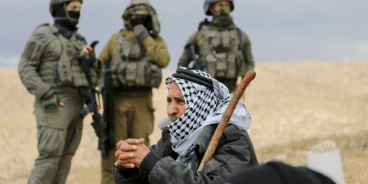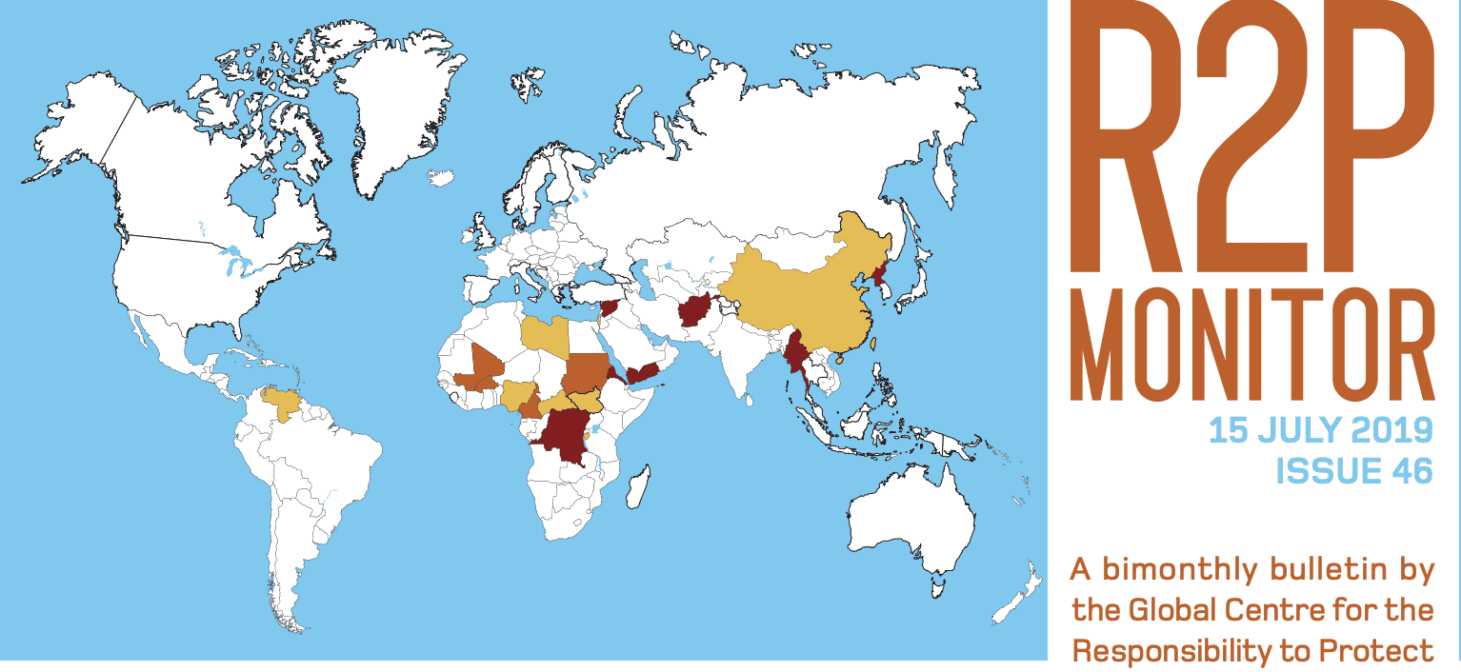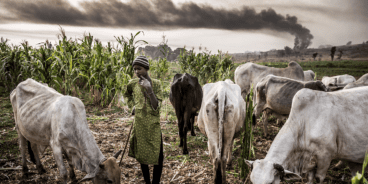

R2P Monitor, Issue 46, 15 July 2019
R2P Monitor is a bimonthly bulletin applying the Responsibility to Protect lens to populations at risk of mass atrocities around the world. Issue 46 looks at developments in Afghanistan, Democratic Republic of the Congo, Myanmar (Burma), Syria, Yemen, Cameroon, Mali and Burkina Faso, Sudan, Central African Republic, Libya, Nigeria, South Sudan and Venezuela.
Highlights include:
Current Crisis
Afghanistan
The UN documented increased civilian casualties in Afghanistan during 2018, largely attributed to the use of improvised explosive devices by the Taliban and other anti-government armed groups. Some progress towards ending the war has been made in talks between the United States and the Taliban, as well as during the Intra-Afghan Dialogue during early July, but a spate of recent car bombings by the Taliban puts into question their commitment to peace.
Democratic Republic of the Congo
Several provinces in eastern DRC – notably North Kivu, South Kivu, Ituri and Tanganyika – have been plagued by recent inter- communal violence and attacks by armed groups. Renewed inter-communal violence in Ituri Province killed more than 117 people between 10-13 June, while more than 100,000 people have been displaced by fighting amongst armed groups in North Kivu since April. Meanwhile, widespread displacement from Ituri and North Kivu contributes to an already precarious security and humanitarian situation as the international community attempts to confront cholera, measles and Ebola outbreaks that have claimed the lives of thousands of people.
Myanmar (Burma)
Since November 2018 conflict has flared in Rakhine State between Myanmar’s military and the Arakan Army (AA), an armed group seeking greater autonomy for the ethnic Rakhine Buddhist population. Myanmar’s security forces have shelled villages, blocked food supplies and arbitrarily detained civilians. Many of the military units fighting the AA have been implicated in crimes against humanity, war crimes and genocide perpetrated against the Rohingya in Rakhine State.
Syria
Since the Syrian crisis began in 2011 the conflict between the government and opposition groups has escalated into a civil war in which at least 560,000 people have been killed. The escalation of fighting in Idlib and adjoining portions of Aleppo and Hama governorates – the last remaining opposition strongholds within Syria – puts populations at ongoing risk of mass atrocity crimes.
Yemen
Despite diplomatic efforts to end Yemen’s four-year war, populations remain at risk of war crimes and are experiencing the largest humanitarian crisis in the world. Despite the December 2018 “Stockholm Agreement” and the ceasefire in Hodeidah largely holding, hostilities have intensified elsewhere, however, particularly in Al-Dhale, Hajjah, and Taiz governorates.
Imminent Risk
Cameroon
Populations in Cameroon are at imminent risk of potential atrocity crimes due to the ongoing crisis in the Anglophone regions and military operations against the armed extremist group, Boko Haram. According to OCHA, eight out of ten regions in Cameroon are currently affected by political violence.
Mali and Burkina Faso
Since 2015 Islamist armed groups have expanded their activities from northern to central Mali, prompting the formation of ethnic militias and armed “self-defense groups” in many communities. A cycle of reprisal attacks in the Mopti region of central Mali has dramatically increased since January, with more than 600 people killed. Most fighting has taken place between Dozos – traditional hunters mainly from the Dogon ethnic community – and ethnic Bambara fighters, against members of the Fulani community. The porous border between Mali and neighboring Burkina Faso has facilitated the expanded activities of Islamist armed groups throughout the region. Since mid-2018 groups operating in Burkina Faso, particularly Ansaroul Islam, have perpetrated atrocities against populations in Soum Province, near the Mopti region of Mali.
Sudan
Following months of mass demonstrations against President Omar al-Bashir’s government, on 11 April the Sudanese military overthrew and arrested Bashir, installing a Transitional Military Council (TMC). Following Bashir’s removal, protesters demanded the transfer of power to a civilian-led government. On 5 July the TMC and the opposition movement finally reached agreement on a power-sharing arrangement. While the power-sharing agreement has brought an end to the deadly standoff between the military and civilian protesters, the risk of further violence remains high unless the TMC strictly adheres to the terms of the agreement.
Serious Concern
Central African Republic
Despite the signing of a peace deal during February, ongoing fighting amongst armed groups in CAR leaves civilian populations at risk of attack.
Libya
On 4 April Field Marshal Khalifa Haftar ordered his self-proclaimed Libyan National Army to launch an offensive against the UN-backed Government of National Accord based in Tripoli. At least 106 civilians have been killed and over 104,000 displaced since 4 April.
Nigeria
Recurring inter-communal violence in the “Middle Belt” region and ongoing attacks by Boko Haram continue to threaten populations in Nigeria.
South Sudan
Despite the September 2018 signing of the Revitalized Agreement on the Resolution of the Conflict in the Republic of South Sudan, conflict-related sexual violence remains rampant in South Sudan with hundreds of new cases reported between September and December 2018.
Venezuela
Since President Nicolas Maduro took office during 2013, popular discontent with the government has led to widespread protests. The government has routinely responded to mass protests with disproportionate and deadly force as well as the mobilization of auxiliary militias, so-called “colectivos.” The Venezuelan government has reported that 6,856 people have been killed in “security operations” since January 2018. From 19-21 June the UN High Commissioner for Human Rights undertook her first official visit to Venezuela, raising alarm about an “unusually high” number of suspected extrajudicial killings.
Related Publications


Atrocity Alert No. 445: Sudan, Syria and Eritrea
